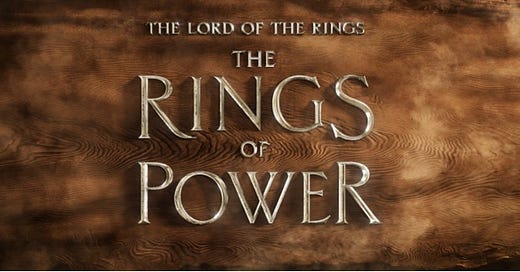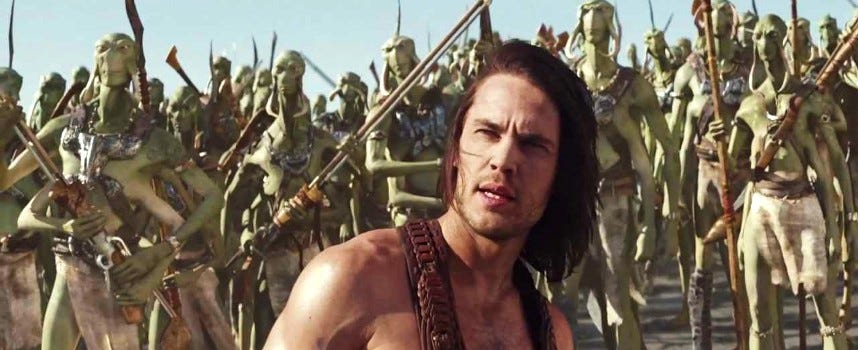What follows is just one man’s opinion, and worse yet: I am that man. If there’s one thing I’ve learned from a lifetime of consuming and producing entertainment, it’s that my opinions are not widely shared. When it comes to what’s good and what’s bad, I am a lonely idiot atop a mountain, whispering opinions into an icy wind that will carry my thoughts quickly to oblivion.
Still, I’m compelled to share this thought: Lore — the explanatory preamble that begins most fantasy tales — is a big bag of hot nothing. It gets in the way of good stories and should be minimized, if not eliminated. We can have tales about elves and dragons and all that fruity mystical crap that people including me love so much, but it would be better if we had it without the lore.
The proximate cause of this tirade is the fact that I recently watched Elves of the Rings: Power of the Lord of Hobbits (or whatever it is — I refuse to look it up). The show begins by burying the viewer under a big steaming pile o' lore. Before we see Hobbit One, we're told about Morgoth and the Legion of Elves and the exodus from Valinor and the orc diaspora and Sauron and a million other things. It felt like an assignment; it felt like I should be taking notes for a test that the TV show was going to give me later. I find it taxing to feel expected to remember things that were thrown at me quickly in a (still too long) montage. I assume that knowing these things is critical to the story, and if that’s not the case, then why was some elf bending my normal-sized ear with this crap in the first place?
This is often the pattern with fantasy stuff. Before we even get a glimpse of our hero, we're told of battles fought long ago by people we've never heard of. These people typically have weird-ass science fiction names like Aelylymmnennon or Zxyxxyzz, and they often inhabit a world that sounds like an anti-herpes drug (e.g. Azeroth). There's often some physical object that was fought over, a ring or sword or gem or amulet or Sandy Koufax rookie card or something. Many times, someone gets cursed, and that has rules all its own, e.g. the curse will only be lifted when the Chosen One licks the Magic Doorknob on Wookiee Christmas blah blah blah blah blah. It's a bunch of shit that you have to remember because it motivates everything that happens; when you find yourself wondering “Why are they entering the Cave of Certain Disembowelment?”, you have to remember that it's so they can retrieve the Cock Ring of Wisdom from The Zombie Co-op before the time parallax closes and Princess Goldenvag is stuck in the body of a Philadelphia Eagles fan forever. Or some such shit.
Many successful movies, TV shows, and video games contain a lot of lore. I humbly suggest that they succeed in spite of the lore, not because of it. Star Wars is a great example; Star Wars begins with a paragraph of lore that they demand that you read before anything happens. What intergalactic balls! It's a fucking movie that starts with “here, read this,” as if the entire fucking medium isn't an end-run around reading. Luckily, the reading comprehension pop quiz proves unimportant, and the movie progresses to good-guys-versus-bad-guys fun very quickly. But in the prequels, the lore suddenly does matter; in The Phantom Menace, you have to understand the rules of Interstellar NAFTA to know why Ewan McGregor and his rat tail are tracking down some kid in the sandy butthole of the universe. And that’s when the story loses momentum.
Many unsuccessful projects have been dragged down by excessive lore. Probably very few of you have seen Dragon Wars, the film that nearly bankrupted the South Korean film industry, but Dragon Wars died an epic box-office death probably in part due to unfathomable amounts of boring-ass lore. John Carter, one of the most notorious bombs of all time, is not nearly as bad as its reputation suggests, but it was similarly hobbled by excessive lore. John Carter’s lore mongering is truly egregious; the movie begins by informing us that there is, actually, life on Mars, and that there is also, in fact, a long-running Martian conflict between the Bleep Blorps and the Gleef Glorps (or whoever). The movie does not inform us why we should give a rat’s ass. I find it incredibly presumptuous to assume that I’ll care about creatures I that didn’t know existed five minutes ago, and even more presumptuous to expect me to develop a rooting interesting in the war between Jimmy McNulty and the Avatar-except-they’re-green-this-time guys. Don’t these writers know that I’m a busy man? I’ve got bills to pay and laundry to do and I need to get my tires rotated and the last thing I need is to sweat the outcome of some far-flung Martian conflict. I’m more than happy to let the Friday Night Lights guy fight it out and just tell me how it went.
The lore obsession seems to violate a fundamental tenet of storytelling: Show, don’t tell. Take any class on screenwriting, read any book on the topic, and you’ll hear “show, don’t tell” more times than you can count. It’s basic enough to be a cliché. And yet studios sink hundreds of millions of dollars into scripts that violate that rule as egregiously as Bostonians flout traffic laws. I see a huge difference between witnessing fantastical characters navigating a made-up conflict and just being told that the conflict happened. The first thing is a story that I can project myself into and potentially find relatable; the second thing is a barrier to entry that the storyteller demands I clear before we can proceed.
I suspect that lore-heavy projects like Lord of the Rings and Dune succeed partly because they’re based on books that spent hundreds of thousands of words extrapolating the lore decades before the movie got to theaters. For people who have read the books, the lore isn’t lore at all — it’s the story. These people have done the homework before they see the film. So, for them, the lore preamble that turns my brain to mush is just a recap of a story they already enjoyed. This provides an entry point for many fans. But when the lore is made up whole cloth (Dragon Wars) or unknown to basically everybody (John Carter), people resent being forced to deal with a whole new set of people and problems that they previously didn’t know existed. It’s a lot like how people responded to the Yugoslav Wars.
At any rate: Those are my thoughts on how some of the most successful media properties of all time are doing it wrong. I’m sure the people behind these projects will barely be able to sleep tonight in their gold-plated mansions knowing that the author of a free blog finds their storytelling turgid. But I stand by my lonely opinion. If an event is important to a story, then make it part of the story; don’t tell me what happened in an awkward preamble and expect me to become invested. Phrased a million times more crudely: Don’t just jam it in me — I require a little foreplay. If you let me experience events in much the way that the wookiee/warlock/wizard/whatever would, then I can become invested in your story. But if you begin by rattling off a bunch of details that I need to internalize before we can proceed, then as far as I’m concerned, your protagonist can go kill the dragon or pawn the ring or finger the princess or whatever they hell they need to do by themselves.






I almost laughed out loud on the 1 train at 6:30am; thanks for a fun read on the way to the gym😂 I 100% agree.
This was hilarious and also spot-on. I’m currently reading Stephen King’s new novel, Fairy Tale, and one thing I like about it is there is absolutely no lore whatsoever. The hero enters a hidden world, and all he knows before he descends the stairs is that the world exists (and there are huge but harmless cockroaches). We discover the rules and history of the hidden world as he does. It’s much more interesting that way!